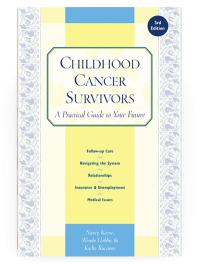Childhood Cancer Survivors
Chapter 14. Kidneys, Bladder, and Genitals
Prosperity is not without many fears and distastes; and adversity is not without comforts and hopes.
— Francis Bacon
THE KIDNEYS AND BLADDER are part of the body’s system for clearing waste (the excretory system). In earlier years, damage to these organs from treatment for childhood cancer was far more common than it is today. Chemotherapy drugs that can be toxic to these organs are now given in lower doses or with protective agents and intravenous (IV) fluids that flush them through the excretory system quickly, minimizing damage. Organ shielding and use of lower doses of radiation have also decreased late effects. But some long-term survivors live with damage to the kidneys and bladder, and a small number of children on newer protocols still develop problems.
The genitals are organs in the body’s reproductive system. Hormones that affect this system are covered in Chapter 9 . Late effects to the vagina, uterus, prostate, and nerves that control sexual function are covered in this chapter.
Signs and symptoms, detection, and medical management of late effects to the kidneys, bladder, and genitals are discussed. Survivors share stories of their experiences and how they cope with damage to these parts of the body.
Table of Contents
All Guides- 1. Survivorship
- 2. Emotions
- 3. Relationships
- 4. Navigating the System
- 5. Staying Healthy
- 6. Diseases
- 7. Fatigue
- 8. Brain and Nerves
- 9. Hormone-Producing Glands
- 10. Eyes and Ears
- 11. Head and Neck
- 12. Heart and Blood Vessels
- 13. Lungs
- 14. Kidneys, Bladder, and Genitals
- 15. Liver, Stomach, and Intestines
- 16. Immune System
- 17. Muscles and Bones
- 18. Skin, Breasts, and Hair
- 19. Second Cancers
- 20. Homage
- Appendix A. Survivor Sketches
- Appendix B. Resources
- Appendix C. References
- Appendix D. About the Authors
- Appendix E. Childhood Cancer Guides (TM)

